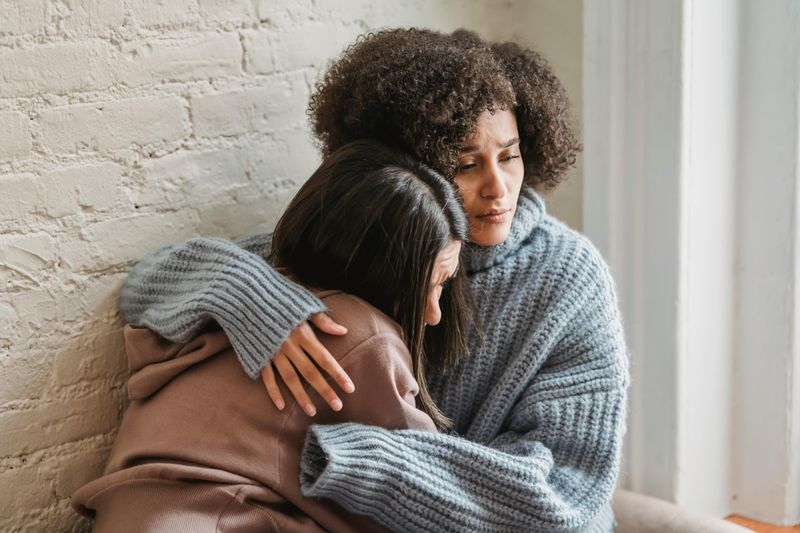Breaking free from a one-sided relationship is like finally putting down a heavy backpack you didn’t realize was weighing you down. The journey afterward brings unexpected clarity and growth. These lessons aren’t just about healing from the past—they’re guideposts for creating healthier connections in the future.
1. Love Should Flow Both Ways
Real love isn’t a tug-of-war where one person does all the pulling. In healthy relationships, both people contribute effort, attention, and care. The constant exhaustion you felt wasn’t normal—it was a symptom of imbalance.
Remember those moments when you planned everything, initiated every conversation, and still felt empty afterward? That wasn’t love; it was emotional labor without return.
Now you understand that authentic connection feels energizing, not depleting. You deserve someone who meets you halfway without being asked, who shows up because they want to, not because you’ve begged them to.
2. Your Needs Aren’t Negotiable
That gnawing feeling when your needs were consistently overlooked wasn’t you being ‘too demanding’—it was your inner wisdom speaking up. Those wants and needs you kept pushing down? They matter.
Remember how small you made yourself trying to fit into someone else’s life? How you convinced yourself that wanting basic consideration was asking too much? Those compromises eroded your sense of self.
Moving forward, you’ve learned to honor your needs as non-negotiable aspects of any healthy relationship. You’ve discovered that the right person won’t make you choose between their happiness and your essential needs.
3. Boundaries Create Safety, Not Distance
Those times you felt guilty for setting limits weren’t character flaws—they were growth opportunities. Healthy boundaries aren’t walls; they’re fences with gates that allow good things in while keeping harmful elements out.
Remember apologizing for asking for space or time for yourself? How expressing discomfort with certain behaviors was met with resistance or manipulation? Those reactions were red flags.
Now you understand that someone who respects you will respect your boundaries without punishment or guilt trips. Setting limits isn’t selfish—it’s self-preservation and the foundation of mutual respect that makes genuine intimacy possible.
4. Red Flags Aren’t Decorations
Those warning signs you rationalized away weren’t isolated incidents—they were glimpses of deeper patterns. Your intuition was trying to protect you, not sabotage your happiness.
Remember explaining away the inconsistency, the subtle put-downs, the broken promises? How you created elaborate stories to justify behavior that made you feel small? That wasn’t love clouding your judgment—it was hope overriding reality.
Moving forward, you’ve learned to trust your gut when something feels wrong. Those uncomfortable feelings aren’t anxiety to overcome—they’re valuable internal guidance systems designed to keep you safe from emotional harm.
5. Your Worth Isn’t Measured by Their Interest
The rollercoaster of feeling valuable when they paid attention and worthless when they didn’t wasn’t love—it was emotional dependency. Your value never actually changed; only your perception of it did.
Remember checking your phone constantly, hoping for a message? How their approval could make or break your day? That wasn’t devotion—it was an unhealthy attachment pattern keeping you hooked on crumbs of affection.
Now you recognize that true self-worth comes from within. You bring value to relationships simply by being who you are, not by what you do for others or how much they desire you.
6. Silence Speaks Volumes
Those unanswered texts, ignored concerns, and dismissed feelings weren’t communication failures—they were clear messages. Silence and neglect are answers; they just weren’t the answers you wanted to hear.
Remember making excuses for their lack of response? ‘They’re busy,’ ‘They’re stressed,’ ‘They didn’t see it.’ The pattern of consistently being overlooked wasn’t a misunderstanding—it was a priority statement.
You’ve learned that someone who values you will find ways to communicate, even during difficult times. Consistent neglect isn’t a puzzle to solve or a challenge to overcome—it’s information about how someone views your importance in their life.
7. You Can’t Love Someone Into Changing
All that energy spent trying to unlock their potential wasn’t an investment—it was a gamble with terrible odds. People change when they want to, not when someone else wants them to.
Remember convincing yourself that if you just loved harder, waited longer, or explained better, they would finally become the partner you needed? That wasn’t optimism—it was wishful thinking that kept you stuck.
Now you understand that accepting people as they are right now—not as who they could be someday—is essential for authentic connection. The right relationship won’t require you to be someone’s unpaid renovation project.
8. Actions Outweigh Pretty Promises
Those beautiful words that never materialized into consistent actions weren’t commitments—they were temporary comfort measures. Promises are easy; showing up day after day is the real work of love.
Remember clinging to apologies and future promises while the same patterns repeated? How a few good days could erase weeks of neglect? That cycle kept you hoping while preventing you from seeing the full picture.
Moving forward, you’ve learned to watch what people do more than what they say. Consistency over time—not intensity in moments—is the true measure of someone’s intentions and character.
9. Solitude Beats Constant Compromise
That fear of being alone that kept you holding on wasn’t protecting you—it was imprisoning you. Being by yourself isn’t a punishment; it’s an opportunity to reconnect with who you really are.
Remember dreading empty evenings or weekends without them? How the thought of starting over seemed more terrifying than staying unhappy? That fear masked a deeper truth: alone doesn’t mean lonely.
You’ve discovered that peace of mind and self-respect are worth more than having someone—anyone—beside you. The space that once felt empty now feels like freedom, a canvas for creating a life that truly reflects your values and desires.
10. Walking Away Shows Courage, Not Weakness
That final decision to leave wasn’t giving up—it was standing up for yourself. It took more strength to walk away than it did to stay and keep trying.
Remember worrying what others would think? How leaving felt like admitting failure? Those concerns were echoes of social conditioning, not reflections of reality.
Now you understand that choosing yourself when someone consistently shows they won’t choose you isn’t selfish—it’s self-preservation. The courage it took to close that door has built muscles of self-respect that will serve every future relationship.
11. Clarity Comes After Distance
That shocking moment when you suddenly saw the relationship clearly wasn’t an anomaly—it was the fog lifting. Sometimes we can’t see the whole picture until we step back from the canvas.
Remember the realizations that came weeks or months after leaving? How behavior you normalized suddenly seemed unthinkable? That wasn’t overthinking—it was your mind finally processing without the filter of hope or attachment.
You’ve learned that time and distance provide perspective that’s impossible to gain while still enmeshed. The clarity you now have isn’t just about that relationship—it’s a sharper vision for all future connections.











